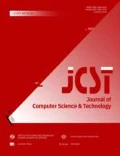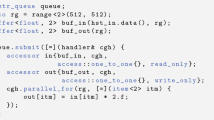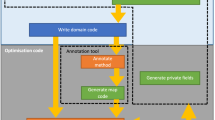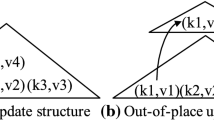Abstract
Page-based software DSM systems suffer from false sharing caused by the large sharing granularity, and only support one-dimensionBlock orCyclicblock data distribution schemes. Thus applications running on them will suffer from poor data locality and will be able to exploit parallelism only when using a large number of processors. In this paper, a way towards supporting flexible data distribution (FDD) on software DSM system is presented. Small granularity-tunable blocks, the size of which can be set by compiler or programmer, are used to overlap the working data sets distributed among processors. The FDD was implemented on a software DSM system called JIAJIA. Compared withBlock/Cyclic-block distribution schemes used by most DSM systems now, experiments show that the proposed way of flexible data distribution is more effective. The performance of the applications used in the experiments is significantly improved.
Similar content being viewed by others
References
Li K, Hudak P. Memory coherence in shared virtual memory systems. InProceedings of the 5th Annual ACM Symposium on the Principles of Distributed Computing, Aug. 1986, pp.229–239.
Keleher P. The relative importance of concurrent writes and weak consistency models. In16th International Conference on Distributed Computing Systems, Hong Kong, May 1996.
Keleher P, Cox A L, Dwarkadas S, Zwaenepoel W. TreadMark: Distributed shared memory on Standford workstations and operating systems. InProceedings of the Winter USENIX Conference, January 1994, pp.115–131.
Hu Weiwu, Shi Weisong, Tang Zhimin. JIAJIA: An SVM system based on a new cache coherence protocol. InProceedings of the High Performance Computing and Networking (HPCN’99),LNCS 1593, April 1999, Amsterdam, Netherlands, Springer-Verlag, pp.463–472.
Anant Agarwal, David Kranz, Venkat Natarajan. Automatic partitioning of parallel loops for cachecoherent multiprocessors. InProceedings of International Conference on Parallel Processing, 1993, pp.I-2–I-11.
Barua R, Kranz D, Agarwal A. Communication-minimal partitioning of parallel loops and data arrays for cache-coherent distributed-memory multiprocessors. InLanguages and Compilers for Parallel Computing, Berlin: Springer-Verlag, August 1996.
Gupta M, Banerjee P. Demonstration of automatic data partitioning techniques for parallelizing compilers on multicomputers.IEEE Transactions on Parallel and Distributed Systems, March 1992, 3(2): 179–193.
Kennedy K, Mckinley K S. Optimizing for parallelism and data locality. InProceedings of the 1992 ACM International Conference on Sypercomputing, Washington D.C., July 1992.
Jennifer M Anderson, Monica S Lam. Global optimizations for parallelism and locality on scalable parallel machines. InProceedings of SIGPLAN’93 Conference on Programming Languages Designed and Implementation, ACM, June 1993.
Hu Weiwu, Shi Weisong, Tang Zhimin, Eskiciogiu M R. The JIAJIA programming manual. Technical Report No.TR980007. http://www.ict.ac.cn/chpc/, July 1998.
Barua R, Kranz D A, Agarwal A. Addressing partitioned arrays in distributed memory multiprocessors —The software virtual memory approach. InProceedings of the MIT Student Workshop, Wellesley, MA, July 1995.
Anant Agarwal, Richardo Bianchiniet al. The MIT Alewife machine: Architecture and performance. InProceedings of the 22nd Annual International Symposium on Computer Architecture (ISCA’95), June 1995, pp.2–13.
Feng Xiaobing. Data distribution — A global optimizing technology [dissertation]. Institute of Computing Technology, Chinese Academy of Sciences, 1999.
Author information
Authors and Affiliations
Corresponding author
Additional information
The work of this paper is supported by the National ‘863’ High-Tech Programme of China under grant No.863-306-ZD01-02-5 and National High Performance Computing Fund.
HONG Jinwei received his B.S. degree in computer science from University of Science and Technology of China in 1996. He is currently a researcher in Chinese High Performance Computing Center (CHPCC) at Hefel. His research areas include parallel and distributed processing, parallel compiling.
CHEN Guoliang graduated from Department of Electrical Engineering, Xi’an Jiaotong University in 1961. He is now a professor of Department of Computer Science, University of Science and Technology of China. And he is the director oof CHPCC. His research areas include parallel and distributed algorithm, intelligent computer architecture, and genetic algorithm.
ZHANG Zhaoqing graduated from Department of Mathematics, Peking University, in 1960. She is a professor of Center of High Performance Computing (CHPC), Institute of Computing Technology, Chinese Academy of Sciences. Her research interests are parallel compiling and parallel programming environment.
Rights and permissions
About this article
Cite this article
Hong, J., Chen, G. & Zhang, Z. Supporting flexible data distribution in software DSMs. J. Comput. Sci. & Technol. 15, 445–452 (2000). https://doi.org/10.1007/BF02950408
Received:
Revised:
Issue Date:
DOI: https://doi.org/10.1007/BF02950408




